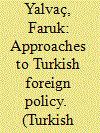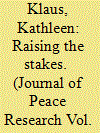| Srl | Item |
| 1 |
ID:
129563


|
|
|
|
|
| Publication |
2014.
|
| Summary/Abstract |
This article analyses different approaches to Turkish foreign policy (TFP) from a critical realist perspective. It seeks to criticize positivist and post-positivist approaches to TFP, arguing for a non-reductionist, historical materialist approach based on the principles of critical realism. It argues that historical materialist approaches are missing both from the analysis of TFP and from the mainstream foreign-policy analysis in general. In emphasizing the importance of a historical materialist approach, the paper also underlines the importance of acknowledging the structural context of foreign policy-making as a complement to the agent-centric, micro-level analyses that dominate the mainstream TFP analysis. Finally, it advocates a research agenda that focuses on the development of a historical materialist approach to TFP.
|
|
|
|
|
|
|
|
|
|
|
|
|
|
|
|
| 2 |
ID:
170804


|
|
|
|
|
| Summary/Abstract |
How does large-scale land reform affect electoral stability and the prospects for election violence? While scholars have theorized elite-level logics of land distribution, few studies analyze the effects of land reform on the attitudes of ordinary citizens, and the implications such reforms have for electoral violence. The article uses an original survey and qualitative interviews in coastal Kenya to examine the effects of the Kenyan government’s recent land titling campaign, the most ambitious and extensive since independence. It theorizes and tests the micro-mechanisms through which the selective distribution of land rights in the pre-electoral period heightens or lowers the stakes of an electoral outcome by altering levels of political trust and perceived threat. Results indicate that title deed beneficiaries are more likely to trust political institutions than non-beneficiaries. Yet, while title deed recipients are more likely to trust state institutions, they are also more likely to fear the electoral process compared to non-beneficiaries. The findings reveal how the perceived stakes of an election can vary across local spaces. Where political trust is low and threat is high, citizens may view elections as particularly high-stakes events and, thus, may be more willing to take on the costs of participation in violence to ensure their preferred political outcome, or to defend themselves against anticipated attacks.
|
|
|
|
|
|
|
|
|
|
|
|
|
|
|
|